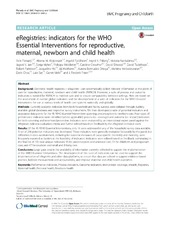eRegistries: indicators for the WHO Essential Interventions for reproductive, maternal, newborn and child health
Flenady, Vicki; Wojcieszek, Aleena M.; Fjeldheim, Ingvild; Friberg, Ingrid; Nankabirwa, Victoria; Jani-Bølstad, Jagrati; Myhre, Sonja; Middleton, Philippa; Crowther, Caroline; Ellwood, David; Tudehope, David; Pattinson, Robert; Ho, Jacqueline; Matthews, Jiji; Ortega, Aurora Bermudez; Venkateswaran, Mahima; Chou, Doris; Say, Lale; Mehl, Garrett; Frøen, Frederik
Peer reviewed, Journal article
Published version

Åpne
Permanent lenke
https://hdl.handle.net/1956/15234Utgivelsesdato
2016-09-30Metadata
Vis full innførselSamlinger
Originalversjon
https://doi.org/10.1186/s12884-016-1049-ySammendrag
Background: Electronic health registries – eRegistries - can systematically collect relevant information at the point of care for reproductive, maternal, newborn and child health (RMNCH). However, a suite of process and outcome indicators is needed for RMNCH to monitor care and to ensure comparability between settings. Here we report on the assessment of current global indicators and the development of a suite of indicators for the WHO Essential Interventions for use at various levels of health care systems nationally and globally. Methods: Currently available indicators from both household and facility surveys were collated through publicly available global databases and respective survey instruments. We then developed a suite of potential indicators and associated data points for the 45 WHO Essential Interventions spanning preconception to newborn care. Four types of performance indicators were identified (where applicable): process (i.e. coverage) and outcome (i.e. impact) indicators for both screening and treatment/prevention. Indicators were evaluated by an international expert panel against the eRegistries indicator evaluation criteria and further refined based on feedback by the eRegistries technical team. Results: Of the 45 WHO Essential Interventions, only 16 were addressed in any of the household survey data available. A set of 216 potential indicators was developed. These indicators were generally evaluated favourably by the panel, but difficulties in data ascertainment, including for outcome measures of cause-specific morbidity and mortality, were frequently reported as barriers to the feasibility of indicators. Indicators were refined based on feedback, culminating in the final list of 193 total unique indicators: 93 for preconception and antenatal care; 53 for childbirth and postpartum care; and 47 for newborn and small and ill baby care. Conclusions: Large gaps exist in the availability of information currently collected to support the implementation of the WHO Essential Interventions. The development of this suite of indicators can be used to support the implementation of eRegistries and other data platforms, to ensure that data are utilised to support evidence-based practice, facilitate measurement and accountability, and improve maternal and child health outcomes.
Utgiver
BioMed CentralOpphavsrett
Copyright 2016 The Author(s)Beslektede innførsler
Viser innførsler beslektet ved tittel, forfatter og emneord.
-
Attributes and consequences of health information systems data for antenatal care : Health status, health system performance and policy
Venkateswaran, Mahima (Doctoral thesis, 2019-11-05)Background: A routine health information system (RHIS) serves as an important source of data for monitoring health of clients and health system performance. All countries use RHIS data for some form of priority setting; ... -
A Critical Perspective on Mental Health News in Six European Countries: How Are “Mental Health/Illness” and “Mental Health Literacy” Rhetorically Constructed?
Van Beveren, Laura; Rutten, Kris; Hensing, Gunnel; Spyridoula, Ntani; Schønning, Viktor; Axelsson, Malin; Bockting, Claudi; Buysse, Ann; de Neve, Ine; Desmet, Mattias; Dewaele, Alexis; Giovazolias, Theodoros; Hannon, Dewi; Kafetsios, Konstantinos; Meganck, Reitske; Øverland, Simon Nygaard; Triliva, Sofia; Vandamme, Joke (Journal article; Peer reviewed, 2020)In this study, we aim to contribute to the field of critical health communication research by examining how notions of mental health and illness are discursively constructed in newspapers and magazines in six European ... -
Health managers’ views on the status of national and decentralized health systems for child and adolescent mental health in Uganda: a qualitative study
Akol, Angela; Engebretsen, Ingunn Marie S.; Skylstad, Vilde; Nalugya, Joyce; Ndeezi, Grace; Tumwine, James K. (Peer reviewed; Journal article, 2015-12-08)Background: Robust health systems are required for the promotion of child and adolescent mental health (CAMH). In low and middle income countries such as Uganda neuropsychiatric illness in childhood and adolescence represent ...
